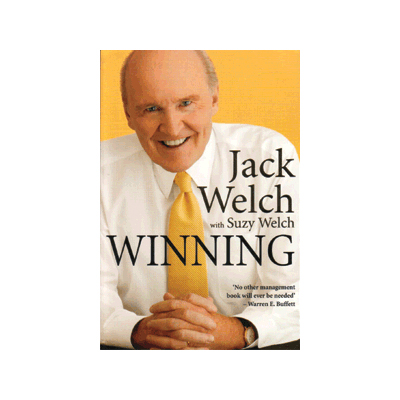Book Review:Straight from the Gut
About the Author - Jack Welch began his career with the General Electric Company in 1960, and in 1981 became the company's eighth chairman and CEO. Mr. Welch is currently the head of Jack Welch, LLC, where he serves as an advisor to a small group of Fortune 500 CEOs and speaks to businesspeople and students around the world. He is the author of the No 1 New York Times bestseller Jack: Straight from the Gut.
"I have been asked literally thousands of questions. But most of them come down to this:
What does it take to win?"
People's quest to be a winner is what motivated Mr GE to pen his second tome. And that too with his younger journalist wife Suzy Welch, a marriage that caused waves in the US when it happened. And it does go into directions where he has not gone before. Winning offers a road map not only for senior level managers and CEOs but also for business owners, middle managers, people running factories, line workers, college graduates looking at their first jobs, MBAs considering new careers and entrepreneurs. In a very lucid manner, the author has drawn out his recipe for people, who maybe either losers or starting out, to become winners.
And what better endorsement can he get but from Microsoft Chairman Bill Gates: "A candid comprehensive look at how succeed in business - for everyone from college graduates to CEOs."
The book is divided into four parts. The first, Underneath it all, is conceptual. This part talks about the mission and values and the ways to achieve success in the business. The mission should be to win in business and for that there should be a set of guidelines and values to be followed. Welch also talks about the lack of candor which is the biggest dirty little secret in business as it blocks smart ideas, fast actions and acts as a killer of success. He admits that candor is something nobody likes because it may upset the status quo, and goes on to add that all his bosses cautioned him about his candor. "But it was my candor, that helped make GE the success it is," he says. "Candor can be the biggest change for the better."
Welch points out that in most companies the 20:70:10 principle is at play, and companies have to take hard decisions: the lower redudant underperforming 10 per cent have to go, while the top 20 per cent have to be consistently rewarded. The most difficult is keeping the middle 70 per cent motivated all the time.It's essential that the message goes out to all that those who can diifferentiate themselves and emerge as standouts, will get rewarded. Differentiation helps clarify business and run it better in every way, he emphasises.
The second section titled Your Company, is about the innards of the organization. It's about mechanics- people, processes and culture. In this, Welch speaks about leadership skills and rules to be a good leader. He introduces the reader with the skill of hiring the right personnel. Welch also talks about the toughest part; letting go. Often in an organization non-performers are fired - this may be the worst day of his or her career. Good managers often find this part the hardest, feeling the guilt, and anxiety before, during and after. He puts forth a two step process to getting firing right. First, No surprises and the second, minimize humiliation.
Your Competition - the third section - deals with the world outside the organization. It says wholesomely about how you create strategies, budgeting, organic growth, merger of two companies, pitfalls of the deal, six sigma (one of the great management innovations of the past quarter century and an extremely powerful way to boost a company's competitiveness.)
In the last two sections, Jack talks of lighter stuff. Your Career, is about managing the arc and the quality of your professional life. Starting with a chapter on finding the right job, it is followed by what it takes to get promoted. It also includes a chapter on how is it to work for a bad boss. The last in this section addresses the human desire of wanting it all at the same time. In the end, Welch tries to tie the loose ends in his section Tying up the Loose Ends which answers nine questions which he came across while writing the book.
The author puts forth real life examples for better understanding, and this leaves an impact on the reader. Throughout the book he shares with readers his experiences at GE - where he was rated among the top managers globally - and what it took to make GE a top global corporation. Undoubtedly, the book as Gates says, is a valuable addition to any manager's shelf.








